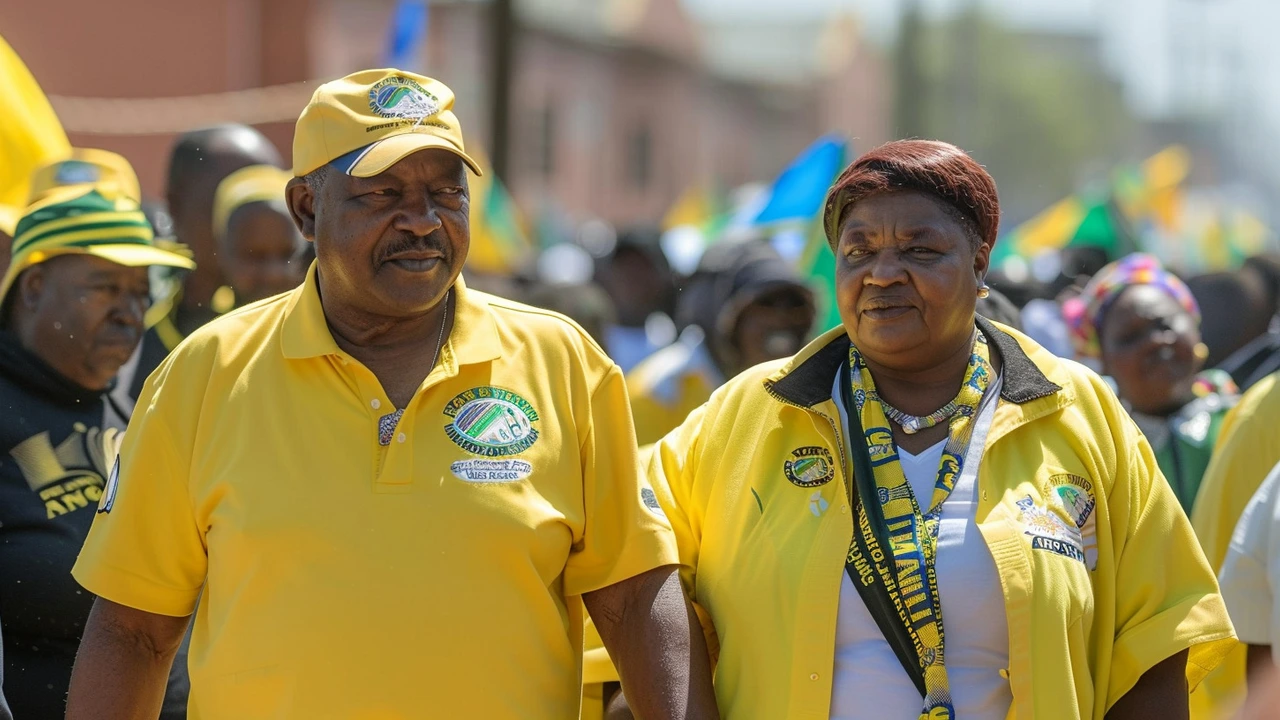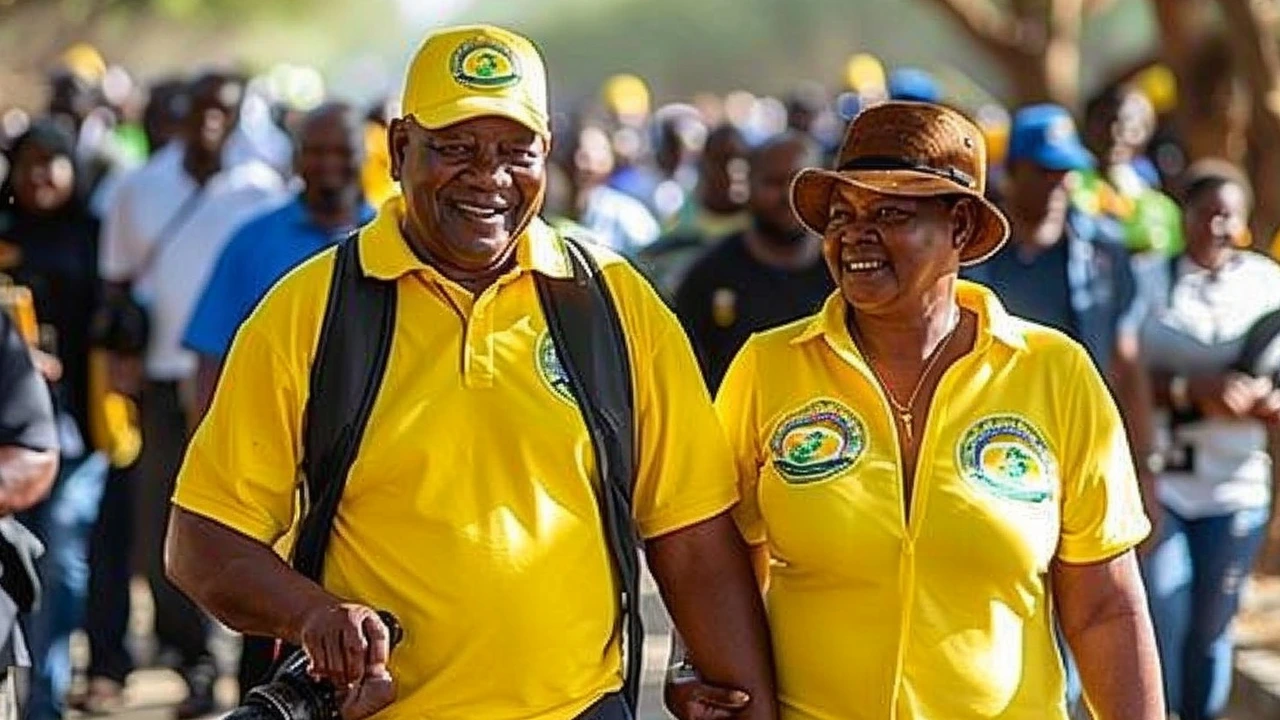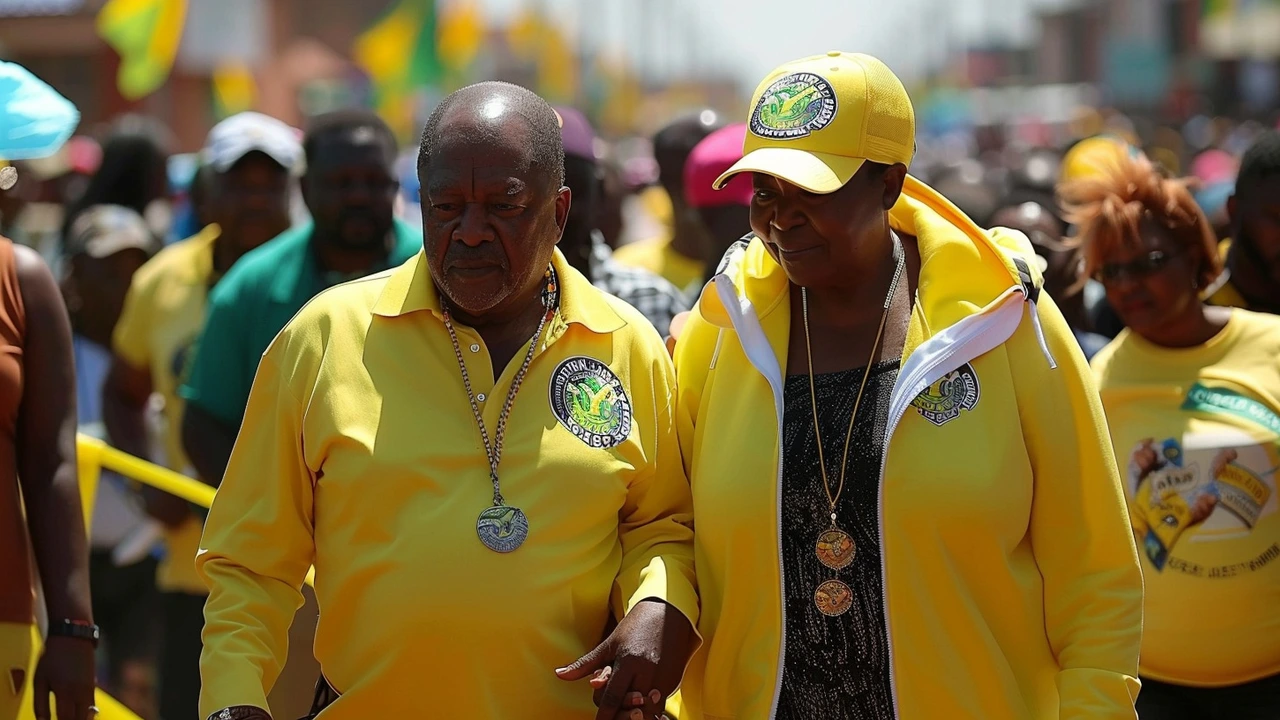Ramaphosa Declares Confidence in ANC’s Upcoming Electoral Victory
Amid the vibrant streets of Soweto, filled with history and cultural significance, President Cyril Ramaphosa made a statement that resonated with both confidence and assertiveness. Addressing a crowd on Vilakazi Street, a site forever etched in South Africa’s struggle for liberation due to its association with figures like Nelson Mandela and Desmond Tutu, Ramaphosa announced that he was incredibly optimistic about the African National Congress (ANC)’s chances in the upcoming general elections scheduled for May 29th.
The mood during this community engagement was charged with energy. Ramaphosa’s words carried a tone of defiance against naysayers and critics who have doubted the ANC’s ability to secure a win in these elections. “Those who believe that the ANC will lose will face disappointment,” Ramaphosa declared, his voice cutting through the buzz of the event. He emphasized that the ANC’s strength and unwavering support across the country would be showcased at their upcoming rally, aptly themed ‘Siyanqoba,’ which translates to ‘we will win’ in Zulu.
Strength Across All Provinces
The rally is not just a political event; it is a strategic demonstration designed to illustrate the depth and breadth of the ANC’s support base across all nine provinces of South Africa. “The rally will be a testament to our supporters and a clear message to the opposition,” stated Ramaphosa. With the party’s extensive campaign efforts reaching from urban centers to rural areas, the ANC is aiming to galvanize its base and present a united front.
Prominent ANC figures were also present, further underlining the importance of the event. ANC Youth League president Collen Malatji was among those who stood alongside Ramaphosa, expressing a contagious optimism about the party’s prospects. Malatji reiterated the critical role the youth play in the party’s future and their commitment to driving the country forward under the ANC’s banner.
Key Figures and Historic Aspirations
Meanwhile, Gauteng Premier Panyaza Lesufi indicated his belief that the ANC could secure over 50% of the votes in the province, a significant benchmark that would cement the party’s influence in one of the nation's most economically significant regions. His comments were well-received, adding a level of tangible credibility to Ramaphosa’s assertions of victory.
The symbolism of Vilakazi Street as the backdrop for this announcement was unmistakable. It is a street that has not only housed titans of South Africa’s liberation movement but also has witnessed crucial moments of the country’s history. Using this location to propel the ANC’s message speaks volumes about the party’s connection to its roots and the enduring legacy it aims to uphold.

Addressing the Critics
Ramaphosa’s confident statements were also aimed at addressing both internal and external critics of the ANC. The party, which has dominated South African politics since the end of apartheid, faces substantial scrutiny amid numerous challenges, including allegations of corruption and economic difficulties. By painting a picture of a resilient and forward-moving ANC, Ramaphosa sought to reassure supporters and counter the narratives pushed by opposition parties.
He didn’t mince words when it came to discussing the unrealistic ambitions of these opposition parties. According to him, the ANC remains the only viable party to guide South Africa toward a prosperous and equitable future. This dichotomy between the ruling party and its rivals was starkly highlighted in his discourse, aiming to sway undecided voters and consolidate the party’s existing base.
The Role of Rallies
Rallies like the upcoming ‘Siyanqoba’ are crucial for the ANC, serving as both a morale booster for its supporters and a public demonstration of strength. These events often gather substantial media attention, translating the energy on the ground into broader public sentiment. For an electorate that has faced a myriad of socio-economic issues, these rallies provide a semblance of unity and purpose.
Beyond the rhetoric, Ramaphosa’s confidence seems to be anchored in meticulous planning and groundwork laid by the party’s campaign teams. The ANC’s strategy includes door-to-door canvassing, leveraging social media, and engaging local community leaders to energize the voter base. The holistic approach aims to leave no stone unturned in their quest to secure a decisive victory.

Historical Context and Future Prospects
The ANC’s history is interwoven with South Africa’s journey to democracy. From its role in overthrowing apartheid to its governance in subsequent years, the party has been central to the country’s political landscape. However, this legacy has also brought substantial expectations and pressures, creating a high-stakes environment for every election.
Economic challenges, service delivery issues, and corruption scandals have cast long shadows over the party’s luminous history. Yet, Ramaphosa’s narrative seeks to turn these adversities into a testament of the ANC’s resilience and dedication to improving the lives of all South Africans.
As election day approaches, the political climate in South Africa becomes increasingly charged. Ramaphosa’s message in Soweto serves both as a rallying cry and a strategic move to fortify his party’s position. The question that remains is whether this display of confidence will translate into the electoral majority the ANC desires.
Conclusion
However, one aspect is unequivocal: the ANC remains a formidable force in South African politics. Ramaphosa’s efforts to solidify this position reflect not just a desire for victory but a commitment to a larger vision for the nation. The streets of Vilakazi bear witness to history, and as South Africa stands on the brink of yet another electoral decision, the echoes of the past are loud in its present and future aspirations.






This is what hope looks like 🙌 South Africa has been through so much, but the ANC still stands tall. Siyanqoba isn't just a slogan-it's a promise. Keep pushing, brothers and sisters!
People forget history. Mandela walked this street. Now we have rallies. Is that progress or just repeating?
Oh wow, another rally on Vilakazi Street. Next they’ll name the new power plant after Tutu and call it ‘Tutu Power’. 🙄
Solid. Just solid. 👊
You think this is about votes? Nah. The real plan is to distract everyone from the load shedding and the corruption. I saw a docu on YouTube-ANC is working with foreign banks to control the currency. They’re printing money to buy votes. Wake up people!!
I cried when he spoke. Really. I cried. I remembered my dad telling me about the struggle, how he marched in '94, how he voted for the first time with tears in his eyes. Now? Now we got this. This is bigger than politics. This is legacy. This is blood. This is soul.
Look, the ANC’s got history but let’s be real-governance is a skill not a birthright. The party’s been coasting on moral capital since '94. You can’t just wave Mandela’s ghost and expect people to forget the queues for water and the R1.2bn in tender fraud. It’s not that I don’t want them to win-it’s that I want them to earn it
I’m curious-how many of the people at that rally actually live in Soweto? Or is it mostly party cadres flown in from Pretoria? I mean, I support the ANC’s vision, but real grassroots engagement feels more like door-to-door than stadium rallies.
The symbolism is indeed potent. However, symbolic resonance does not equate to policy efficacy. One must distinguish between rhetorical flourish and measurable governance outcomes.
They always say 'we will win' but when did they ever win the economy? Or the schools? Or the hospitals? You can't rally your way out of corruption. Just saying.
This is the most dramatic moment since the fall of apartheid. I can feel it in my bones. The people are rising. The ghosts of Mandela are watching. If they lose, it won’t be because of voters-it’ll be because the system rigged it. I’ve seen the videos. The voting machines? They’re not real. They’re controlled by the IMF. I know people who know people.
History doesn't repeat, it rhymes. And the rhyme here is exhaustion. The ANC isn't winning hearts-it's winning fatigue. People vote for them not because they believe, but because they're tired of choosing between fire and flood.
We need more than speeches. We need action. Clean water. Reliable electricity. Jobs for the youth. No more slogans. No more photo ops. Show us the plan. Then we’ll believe.
Wait so the ANC is gonna win? Bro, the DA is polling at 28% in Gauteng. EFF’s got the youth. And what about the new parties? This is 2024, not 1994. The crowd at Vilakazi is just the same 500 people every time. 🤡